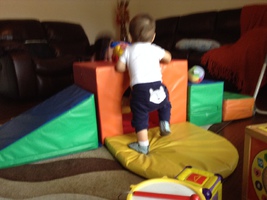
Amaros child care is located in Lakewood CA.
Program Philosophy: Learning through Play
Why do we believe play-based learning is so important for young children? When young children play, they take the initiative - choosing where they want to play, coming up with ideas, and trying them out. However, this doesn't mean that their teachers do nothing but move around and watch. Rather, teachers have an important role in helping children learn through play.
Teachers are proactive setting the stage for children's learning by selecting materials they know will engage the children and organizing them effectively in interest areas. They provide guidance if the children need help and ask questions to spark children's thinking while allowing and encouraging them to experience the power of feeling in charge of their own learning. In any one play period, your child might choose to work on a puzzle, build a block tower, look through a familiar (or not so familiar) book, and play a game with a friend. When your child is free to follow his or her own interest, learning happens naturally.
Contact us at:
12623 Stillman St.
Lakewood, CA 90715
Phone: (562) 860-1462
Email: Amaroschildcare@gmail.com


